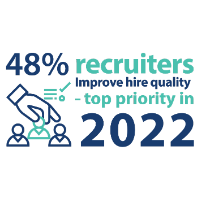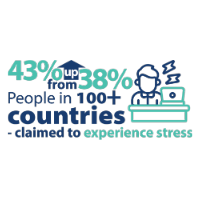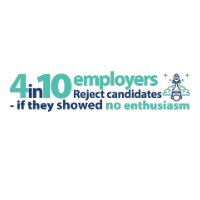Regardless of the why, you’re job hunting. Your experience and expertise mean you have an impressive skillset to show off. However, it’s been a while since you last entered the talent market. A great way to get advice before you start your hunt is to network and reach out to recruiters. Recruiters work with job seekers every day and can lend that guiding hand with any questions or concerns you might have throughout the recruitment journey. Before reaching out to a recruiter and/or starting your job hunt it's advised to update your CV and brush up on your interview skills.
Update your CV
According to Indeed, recruiters spend 6-7 seconds scanning a CV before deciding on whether to move forward with a candidate when scanning their CV. No matter what your experience, a badly formatted CV is going to hinder your job search. It’s crucial that you have the right information clearly visible to be considered by hiring managers.

Polish your job interview skills
Job interviews, no matter where you are in your career, can be tough and stressful. And sometimes, an unexpected question can throw you off. Such questions are designed to get an idea of how an applicant can think on their feet. 48% of recruiters say improving the quality of hire is their top priority in 2022. Candidates have to ensure to say the right things at the right time, to prove they're best suited for the job.
Here are a few tough questions that an interviewer may ask them and sample responses to help you.
6 tough job interview questions
1. Why are you looking for a new job?
Expect the interviewer to ask your reasons for leaving your current role. In the modern world of work, 40% of LinkedIn users change their job, company, or industry every 4 years. Long tenure just isn’t the norm anymore. If you’ve been in a job for a long time, emphasise that you stayed because it was fulfilling to you. In most cases simply tell the truth, you opted to pursue new challenges and opportunities and state what they were. It’s important to have a clear reason for the change and what you expect from the future. Regardless, each situation is unique, so ensure to tailor your response that fit your circumstances.
Sample Response #1:
“While I learned valuable skills working in the same company for more than a decade, I wanted a new challenge and to focus on career progression. I enjoyed my role but felt that I’d hit a ceiling in terms of development and progression. So, I felt it was the right time to face new challenges and to make an impact in a different organisation.”
Sample Response #2:
“Moving on because of company restructuring was a blessing in disguise. I was in a bit of a rut, and I now have an opportunity to explore jobs at organisations that better suit my future growth plans.”
2. Why should we hire you for this role?
It’s important to explain how your experience will benefit the company if you are hired. Be prepared to answer competency-based questions about your past roles’ accomplishments. A good tactic is to carry out preliminary research on the role and make recommendations for improving a few aspects of the work. Constructive advice based on real-world instances will not only legitimise your experience but will also make it easier for the hiring manager to see you as a member of the team.
Sample Response #1:
“I have the experience to help guide and support everyone’s efforts. During my last role, I managed an 8-person sales team, and together, we drove 40% of the overall sales. I know this job involves a lot of teamwork and group projects, and this is a working style in which I excel.”
Sample Response #2:
“I feel my skill set is a perfect match for the job requirements. My research, experience, and analytical skills, make me an excellent fit. For example, I’ve looked into how we could increase website conversions by 15% by simply targeting users with more personalised content.”
3. How do you handle failure?
Asking how you handle failure can reveal to the interviewer what your thought process is during adversity, and how you overcome it. To answer this question best, describe scenarios where you took responsibility for a failing and how because of this learning, you take steps to avoid recurrences of similar setbacks.
Sample Response #1:
“As a project manager, I was keen to please one of my previous company’s biggest clients. I gave them a timeline of 2 weeks to finish a project. I thought this was doable, but it took three weeks, and they were upset. In retrospect, I realise I should have been more cautious in my estimates. As a result of this experience, I have improved my ability to manage client expectations by providing realistic timelines and delivering on time.”
Sample Response #2:
“I was a warehouse manager in my last job. The corporate had installed new software and had provided adequate training for using it. But while processing an order, I mistakenly duplicated it and charged the client twice. It was an exorbitant amount. I noticed that I didn’t follow the proper protocol of the software that would have caught this error. Fortunately, the client was very understanding and didn’t raise a complaint. Learning from this hiccup, I now keep a thorough checklist for each order to ensure consistency.”
4. How do you deal with stressful situations?
According to Gallup’s State of the Global Workplace 2021 Report, 43% of people in over 100 countries claimed to have experienced stress, up from 38% in 2019. Companies are increasingly focussing on stress management to build a psychologically safer workplace following the pandemic.
With this question, the interviewer is essentially asking if you can handle job-related stress, and what you do in stressful situations. Never claim not to be stressed. Because everyone feels anxious at some point in time. List your interpersonal abilities, such as problem-solving and decision-making, in a constructive way to demonstrate how you survived a tough scenario. If applicable, you can explain how you operate more productively under some levels of stress.

Sample Response #1:
“I act in response to the situations, instead of being stressed. When I am dealing with an unsatisfied client, for example, I focus on addressing the problem at hand and on managing expectations. I believe my ability to communicate effectively during such challenging moments helps me to keep the client’s needs in mind and find a resolution which suits everyone.”
Sample Response #2:
“I feel ‘positive pressure’ when working on multiple assignments or a looming deadline, which is good for me. Once, I had had 3 critical tasks due in the same week, which put me under a lot of pressure. But, because I am proactive and good at multitasking, I created a detailed schedule for myself to follow. This really helped me in submitting all the tasks on time while avoiding unnecessary stress.”
5. What challenges are you looking for in this position?
The interviewer wants to know how you plan to approach a new role in a new company, and what motivates you beyond compensation. 4 in 10 employers would reject a candidate if they showed no enthusiasm. It’s good to show some excitement about working at a new organisation, the challenges you are seeking, and to be able to effectively utilise your experience and expertise. Connect your answer to the job requirements, whether it is to demonstrate your skills or express that you are motivated by challenges.

Sample Response #1:
“In my last job, my primary responsibility was to manage the social media pages. However, over the years, I took on additional responsibilities, such as analysing company website performance and editing company web pages on the content management system. I look forward to putting these skills to use in this role to enhance the company’s digital presence.”
Sample Response #2:
“I am particularly excited to take on large-scale projects. In my last position, I oversaw several big-budget assignments, and I really enjoyed the added challenge and responsibility. I want to continue to improve my skills and demonstrate that I can handle multiple projects simultaneously. I feel the scale and significance of the projects in this role can push me to grow professionally.”
6. What are your salary expectations?
What are your salary expectations is a simple question, and yet, complicated to answer. Salary is not an easy topic, and while there is no right or wrong response, there is a way to prepare for it. You should have an idea of what someone in your industry with your experience, typically earns. This will allow you to establish a reasonable salary range and prepare you for salary negotiations.
Sample Response #1:
“My salary range is flexible. Of course, I would like to be fairly compensated for my decade of marketing experience and award-winning campaigns. However, I am open to discussing numbers, once we have discussed the details of the role.”
Sample Response #2:
“First and foremost, I would like to gain a clear understanding of the responsibilities that come with this role. However, based on my 8 years of experience, skills, and certifications, as well as my understanding of what positions similar to this one pay, I would expect a salary in the range of X. Again, I am willing to talk numbers after I have better knowledge of the role.”
For in-depth insights into salaries of different sectors, check out our Salary Guide for Ireland.
Conclusion
Reflect, rather than react while answering unexpected questions. If you're faced with a tough job interview question stay calm, take a moment to collect your thoughts, and reply with logic and confidence. Don't let an unexpected question throw you off course on your journey to your dream job.
Looking for more job interview advice? Get in touch to learn more about taking the next steps in furthering your career.
Sources:
Indeed Career Guide, How Long Do Hiring Managers Look at a Resume? Indeed, 2021
State of the Global Workplace: 2022, Gallup, 2022.
Job Interview Statistics - Latest and most important job interview stats in 2022, Job Description Library, 2022
